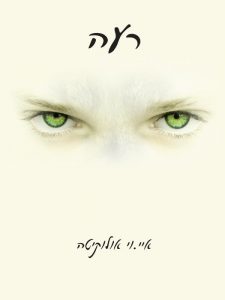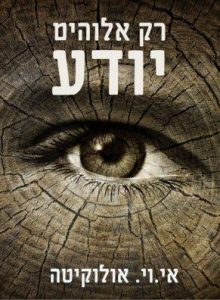
I.V. Olokita specializes in management of medical aid to disaster areas all over the world. He has a BA degree in logistics, and an MA degree in emergency and disaster situations management. He also volunteers to rescue missions in disaster areas all over the world. I. V. Olokita is a happily married father of two adolescents and a foster father of five cats and two dogs. By the way, he hardly ever sleeps. Instead, he spends his nights on writing.
Olokita’s first book (in Hebrew), Ten Simple Rules, was published in 2014. It won an Israeli literary prize, and immediately made an online bestseller. The following year, another book by Olokita, Reasons to Kill God, made a local bestseller in Israel. In May 2016, his third novel, Wicked Girl, was published, to make another great success, and soon presents in English. Olokita’s books are characterized by direct writing, Turns wiry and witty, requiring the reader to delve into and maintain vigilance from the beginning of the book to its surprising end.
Olokita contacted me to share an original short story on my blogblogblog (read here) and also graciously agreed to an interview. I liked his short story, so shared it as a Flash Fiction Friday guest author post. His books sound powerful; I look forward to English versions. Keep an eye open for this author’s work. Follow links at end of interview to connect with Olokita, and trailers to make you long for the books.
Describe your writing process. What is your writing schedule? Do you have an office in your home, or do you work at a remote location? What inspirations do you have for writing—people, places, or things? How do you choose your subject matter?
Since I’m almost out of the house because of my type of work, I do most of the writing in remote places and late at night. Sometimes there is no lighting, and usually, the electricity is minimal, so I don’t have many choices but improvise. Nevertheless, to this day I finished writing seven books, all of them I wrote on my cell phone, in my Gmail drafts. Sometimes my wife laughs at me in this matter. “Who writes books on a cell phone?” She asks me, and I don’t have the right answer, so I reply with a smile, “I do.”

Usually, my subjects begin with a dream or, more precisely, a nightmare. Since I have engaged in this profession of wounded and dying people for almost twenty-five years, it is tough for me to sleep, and when I do so, I have bad dreams. So, I wake up immediately and start writing the chapters, and the whole writing process from that moment takes about one to two months until the book is ready for my beta readers to have their mind of it. My inspiration probably comes from sights and stories that I see and hear during work. Over time all these are processed and changed, taking another form. My books deal with the difficult issues of life, not necessarily dark, humorless stories, but most subjects that people don’t openly talk about—the worldview from the eyes of a Nazi criminal or a pedophile, the point of view of our perfect enemy, or that of the most cunning deceiver who ever entered our lives. All these are presented to the reader as one piece, so at the end of the insights, the reader can agree or deny them. In every story I write, there are at least three layers and many plots that intersect each other into an entire story that moves on a past-present timeline. The reader will enjoy the first reading of what the eye views; during the story he will try to guess where this story leads him. In this context, I have not met anyone who has read my books and managed to think the end of the story during the reading, at least not until he finished the last word of the book. Mainly because what happens in it depends very much on the perspective of the reader at the same point he is at, and his willingness to penetrate the story’s guts, sometimes even finishing the book and immediately rereading it to find this time he is reading a completely different one.
Tell me about your publishing process and your publishing team. How much input are you allowed? How much marketing is expected by you as the author?
Every time someone asks me what is important to me in my books, I reply that I want my stories to be read by as many people as can be. It’s not a matter of money or profit and loss. I have important things to tell the world, and this is my real calling. In that aspect, I was fortunate to be a beginner in Israel. When I published my books in Hebrew, they immediately received considerable attention. As far as I am concerned, it was a complete surprise, mainly because I am an indie writer who corresponded with his readers on Facebook and did not invest too much in marketing. The decision to go on Amazon in another language was not easy for me. There are many aspects here, each of which can significantly reduce the quality of the books— mainly translation and editing, but in this case, marketing is also a significant factor.

So, after I finally made the decision, I made a great effort to find the right professionals, and I’m glad I did, despite the enormous financial cost to me. I believe that the readers who will be exposed to my books will enjoy a high language and a story that stretches and is tightly written, just like in the original language. As for marketing, I rely on the group of professionals who stand behind me and support me; it will allow me to keep in touch with my readers and write them new books instead of spending my time marketing activities. As long as it’s up to me, I’ll go on like this until I’ve run out of money and the last reader in the world will read what I have to say.
Talk about your support system. Whose praise motivates you? Who keeps you motivated?
This will be a concise answer; I write because I have to write. Otherwise, I’ll probably go crazy. The only prize that interests me is the one I already won many years ago, a fantastic wife who contains my obsessions of writing books and allows me to spend all our money on them and two amazing children who, despite their adolescence, are still very proud of their father.
As a humanitarian, how does your life influence your writing? Does your writing influence your life?
I think I’ve written all my life, just from a young age. It was a mechanism I had developed to relieve all my frustrations and disappointments over the years. Writing accompanied me at school and later in my adult life without even planning to publish it as a book. In this sense, my life always influences my writing and vice-versa; everything I experienced went into my books and I processed into a story. Therefore, that everything becomes a story never bothers me anymore. As someone who is responsible for managing a complete medical response to extreme humanitarian events, this system helps me deal with the main sights, smells, and sounds that remain in me. Writing too, like psychological therapy, for example, does not clean everything out of your system, but allows me to continue to function and live a completely normal life.
What do you love most about your creativity?

After I published my third book, questions began to arise that intrigued many of my readers, “Why are all your heroes bad people in essence, and why is the end of the story never good?” I think the answer to these questions is that even though we want to, our world is not a right place to live. I try in my books to show the other side of life, but people argue that despite the controversial issues and controversial characters, my books provide a more optimistic view of the world, basically, that we all end up only human beings, and the change begins with our understanding of each other’s motivation. I think it’s a matter of perspective that my books and short stories provide to the reader.
As for that legitimate question regarding my sources of inspiration about my written heroes, I have never known a Nazi criminal nor a pedophile, and I have no idea how they feel like in real life. However, I certainly give my heroes fears and desires, punish and reward them when I am sad or happy, and they end up getting a slice of my own life.
Connect with Olokita: